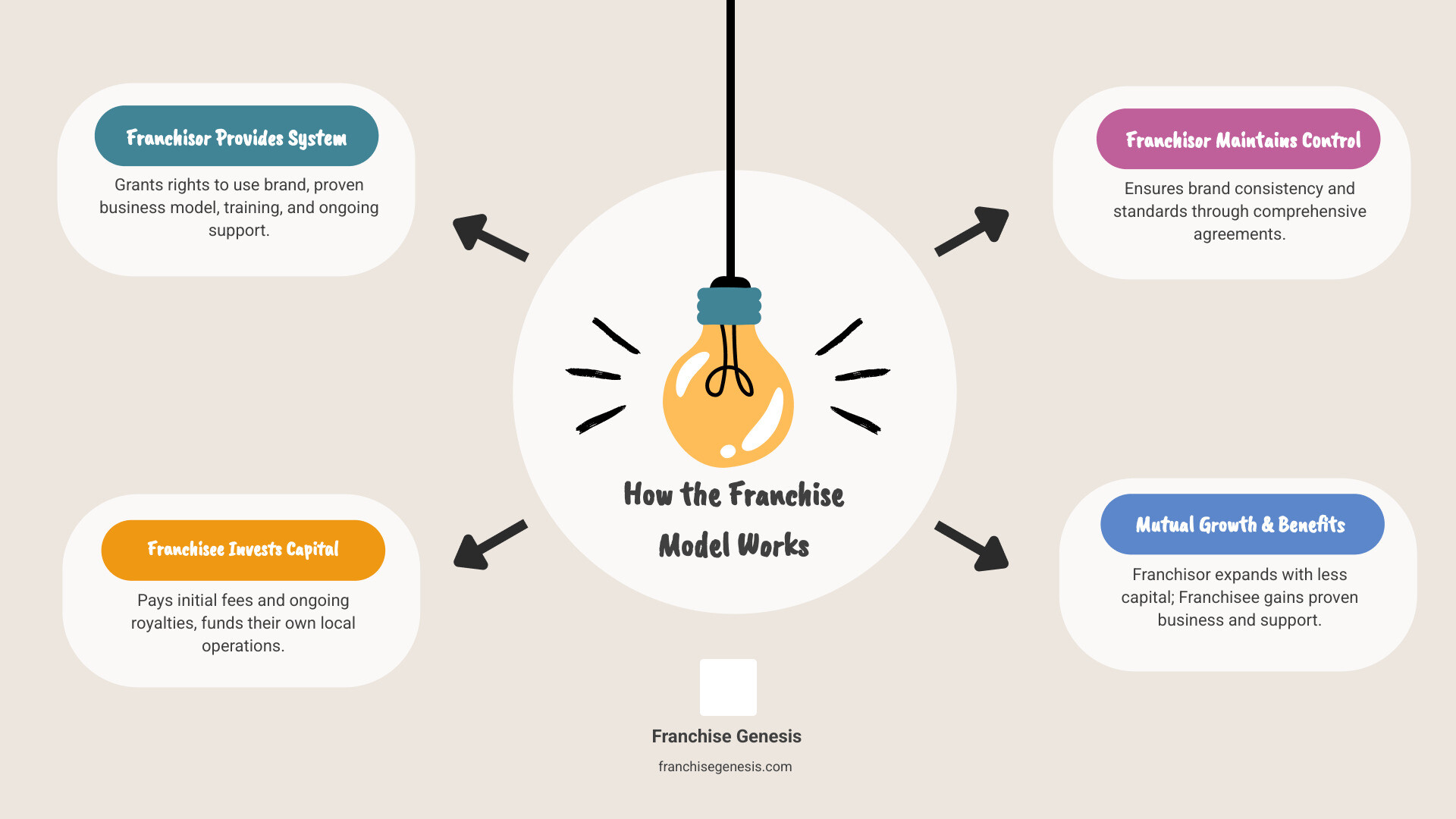Understanding the Franchise Business Model
How does a franchise work is one of the most important questions business owners ask when considering expansion beyond their initial location. At its core, franchising is a business model where you (the franchisor) grant independent operators (franchisees) the right to use your brand, systems, and proven business model in exchange for fees and ongoing royalties.
Here’s how the franchise model works in simple terms:
- You provide the system – Your proven business model, brand, training, and ongoing support
- Franchisees provide the investment – They pay franchise fees and fund their own locations
- You maintain control – Through franchise agreements that ensure brand consistency
- Both parties benefit – You expand without using your own capital while franchisees get a proven business model
The franchise relationship creates a partnership where franchisees operate under your brand while following your established systems and standards. You make money through initial franchise fees (typically $25,000-$75,000) and ongoing royalties (usually 4-8% of gross sales). This allows you to grow your brand rapidly while franchisees handle the day-to-day operations of individual locations.
Key benefits for franchisors include:
- Faster expansion with less capital investment
- Motivated owner-operators running each location
- Shared marketing costs across the system
- Revenue from multiple income streams
As Vice President of Operations at Franchise Genesis, I’ve helped dozens of business owners understand how does a franchise work and successfully launch their franchise systems. My experience includes scaling an ABA therapy franchise to over 100 locations within its first year, demonstrating the powerful growth potential of the franchise model.

How does a franchise work terms to learn:
The Franchise Model as a Growth Engine
Think of franchising as how does a franchise work to turn your single successful location into a powerful network of motivated business owners. It’s a systematic growth engine that can transform your local business into a regional or national powerhouse. The model has a long history, with pioneers like Isaac Singer using it in the mid-1800s to expand faster by partnering with local operators. Today, franchising is a massive economic force, with nearly 800,000 establishments in the U.S. contributing over $500 billion to the economy.

Understanding how does a franchise work means grasping the partnership between two key players. As the franchisor, you provide the proven business model, brand, and systems. Your role shifts from running a location to architecting the growth of many. The franchisee is your business partner who brings capital, local knowledge, and entrepreneurial drive. They are independent owners who invest in and operate a location using your playbook.
This partnership creates capital-efficient expansion. Franchisees fund new locations, allowing you to achieve rapid market penetration and brand building without the immense cost of corporate-owned growth. It’s a win-win that transforms your successful business into a scalable growth machine.
For a deeper dive into the fundamentals, check out Franchising in America: The Development of a Business Method or explore our comprehensive guide What is Franchising?.
Why Franchise Instead of Opening More Corporate Locations?
Every successful business owner faces this question: open more locations yourself, or franchise? While corporate expansion offers total control, it also means shouldering all the financial risk and management burdens, which limits growth. Franchising offers a smarter path.
| Feature | Franchising | Corporate Expansion |
|---|---|---|
| Capital Investment | Franchisees fund their own locations, freeing up your capital | You fund every location, limiting growth speed |
| Growth Speed | Multiple franchisees can open simultaneously in different markets | Limited by your available capital and management bandwidth |
| Management Burden | Franchisees handle day-to-day operations as motivated owners | You hire and manage employees for every location |
| Local Market Expertise | Franchisees understand their communities and customer base | You need extensive market research for each new area |
| Risk & Liability | Shared with franchisees who have their own investment at stake | All operational and financial risks rest with your company |
| Owner Motivation | Franchisees are highly motivated – it’s their money and their business | Store managers are employees without ownership stake |
| Overhead | Franchisees cover their location costs, staffing, and local expenses | Your overhead increases with each new corporate location |
The advantages are clear. Franchising leverages the power of motivated owners who have invested their own money, leading to stronger performance than a typical employee-managed location. This model also provides faster growth speed and reduced overhead because franchisees fund their own expansion. You benefit from their local market expertise and shared risk, allowing your business to scale intelligently by leveraging external capital and local talent to achieve growth that would be far more challenging on your own.
How Does a Franchise Work: The Franchisor’s Perspective
Now that we understand the strategic advantages, let’s dive into the practicalities of how does a franchise work from your vantage point as the franchisor. Your role transforms from a hands-on business owner to a system architect and brand steward. You’re no longer just selling a product or service—you’re selling a complete, replicable business model.
This requires mastering several key areas: building replicable systems, navigating legal obligations, creating scalable revenue streams, providing comprehensive franchisee support, and maintaining strict brand consistency. Our Guide to Franchising offers deeper insights into this journey.

Establishing the System and Legal Framework
The foundation of a successful franchise is a well-documented system and a solid legal framework. This starts with creating standard operating procedures for every aspect of your business. These procedures are compiled into your Franchise Operations Manual, the bible for your franchisees that ensures a consistent customer experience everywhere. Learn more in our Franchise Operations Manual guide.
Legally, you must protect your intellectual property by securing trademarks for your brand name and logos. The relationship with franchisees is governed by two crucial documents:
- The Franchise Disclosure Document (FDD): A comprehensive legal document required by the Federal Trade Commission (FTC) that provides full transparency to prospective franchisees. It covers 23 specific items about your company, the costs, and the support you provide. You must give this to a prospect at least 14 days before they sign or pay. The FTC’s Franchise Rule Compliance Guide details these requirements.
- The Franchise Agreement: The binding contract that outlines the terms of the partnership, including duration, territorial rights, fees, and operational standards. It is designed to protect your brand and ensure consistency.
How a Franchisor Makes Money from the Franchise Model
Understanding how does a franchise work financially is key, as it creates multiple revenue streams that scale with your network:
- Initial Franchise Fees: A one-time fee (typically $25,000-$75,000) paid by new franchisees. This covers your costs for recruitment, training, and launch support.
- Ongoing Royalties: The primary recurring revenue source, usually 4-8% of a franchisee’s gross sales. This funds your ongoing support and drives your profitability.
- Advertising Funds: An additional percentage (often 1-3% of sales) pooled from all franchisees to fund system-wide marketing campaigns that benefit everyone.
- Other Revenue: Income can also come from supply chain revenue (selling products or negotiating supplier rebates) and technology fees for proprietary software.
You can explore more about the financial aspects in our Franchise Startup Costs guide.
Providing Support and Maintaining Control
The magic of how does a franchise work lies in balancing comprehensive support with necessary control. Your success is tied to your franchisees’ success.
Key support functions you must provide include:
- Franchisee Training: An intensive initial program covering all aspects of your business model, from operations to marketing.
- Ongoing Support: Continuous operational guidance, troubleshooting, performance coaching, and system updates.
- Marketing Assistance: Providing local marketing strategies, promotional materials, and grand opening support to ensure consistent brand messaging.
- Site Selection: For location-based businesses, you’ll help analyze demographics, evaluate leases, and approve sites to maximize success.
Maintaining control is about protecting the brand for everyone. This is achieved through brand standards enforcement and quality control systems that monitor everything from cleanliness to customer service. This dual role of supporter and enforcer is essential for building a franchise system that thrives long-term.
Is Your Business Ready for Franchising?
Before diving into the mechanics of how does a franchise work for expansion, you must honestly assess if your business is truly ready. Not every successful business is franchisable. It requires a proven, profitable, and replicable model. Our Why You Should Franchise resource can help guide this critical decision.

Assessing Your Business’s “Franchisability”
To determine if your business is ready, examine these key factors:
- A Proven Track Record: You need several years of consistent, repeatable financial success. A single good year isn’t enough to prove the model works.
- Unique Selling Proposition (USP): What makes you different and better than the competition? Your USP must be strong enough to attract both customers and franchisees.
- Documented Processes: Your business model must be teachable. If success relies on your personal, untrainable skills, you’re not ready. Every procedure must be written down.
- Strong Financial Performance: Your profit margins must be healthy enough for a franchisee to pay royalties and still earn a good living.
- Market Demand and Scalability: Your concept must be appealing in different markets, not just your local neighborhood. It needs to be adaptable to scale regionally or nationally.
The key is building a framework that allows others to replicate your success.
Understanding the Financial and Personal Shift
Franchising your business involves a complete operational and personal change.
The financial shift requires a significant upfront investment. This includes:
- Upfront Legal Costs: You’ll need experienced franchise attorneys to create your FDD and franchise agreement, ensuring compliance with all laws.
- Franchise Development Budget: Beyond legal fees, you’ll invest in creating operations manuals, marketing materials, and a sales infrastructure.
- Ongoing Support Infrastructure: You must build a team to provide continuous training, marketing, and operational guidance to your franchisees.
The personal shift is equally significant. Your role changes completely:
- Transitioning from Operator to Leader: You’ll move from doing the work to coaching and empowering other entrepreneurs to do it.
- Managing Relationships: Your job becomes managing partnerships with independent business owners, which requires strong communication and diplomacy.
- Coaching Franchisees: Your success now depends on your ability to train, motivate, and support others. You must be a teacher and a mentor.
Before taking the leap, honestly assess if this new role excites you. Understanding how does a franchise work from a franchisor’s perspective means recognizing this fundamental shift in mindset and skills.
The Step-by-Step Process to Franchise Your Business
You’ve assessed your business and are ready for the shift. Now it’s time to build your franchise system. Understanding how does a franchise work in practice involves strategic planning, legal documentation, and franchisee recruitment. Our Franchise Growth Strategies can provide additional insights.

How does a franchise work in the initial setup phase?
The initial setup transforms your business into a replicable system. Key steps include:
- Legal Structuring: Establish a separate legal entity for franchising to protect your original business and register your trademarks to protect your brand.
- Operations Manual Creation: Document every procedure of your business in detail. This manual is the DNA of your business and the primary tool for ensuring consistency.
- FDD Development: Work with a franchise attorney to create your Franchise Disclosure Document (FDD). This legally required document provides full transparency to prospective franchisees.
- Financial Modeling: Create realistic financial projections for both a franchisee and your own franchisor entity, projecting revenue from fees and royalties.
- Training Program Design: Develop a comprehensive training program that combines classroom learning with hands-on experience to prepare new franchisees for success.
For more guidance on these first steps, explore our resource on How to Franchise My Small Business.
How does a franchise work for sales and onboarding?
Once your system is built, your focus shifts from attracting customers to attracting entrepreneurs.
- Create Your Ideal Franchisee Profile: Define the financial capacity, experience, and personality traits of the perfect partner for your brand. Are they coachable and a good brand ambassador?
- Market to Potential Franchisees: Develop a dedicated franchise recruitment website and marketing materials to attract qualified candidates. This is about selling a business opportunity, not a product. Our Franchise Sales & Marketing page offers deeper insights.
- Hold Findy Days: Host invitation-only events where serious candidates can experience your culture, meet your team, and validate the opportunity. It’s also your chance to assess them.
- Use a Thorough Selection Process: Review applications, conduct interviews, and perform background checks. This due diligence protects both you and the candidate, leading to better long-term partnerships.
- Provide Initial Training and Onboarding: Once the agreement is signed, the new franchisee undergoes your intensive training program to prepare them for a successful launch.
This systematic approach ensures you attract committed franchisees who are prepared to grow your brand.
Frequently Asked Questions about Franchising Your Business
As you explore turning your business into a franchise, it’s natural to have questions. Understanding how does a franchise work involves grasping your responsibilities, the control you maintain, and the ongoing relationship with franchisees. Here are answers to the most common concerns.
What are my legal obligations as a franchisor?
Your primary legal obligation is to provide every prospective franchisee with a Franchise Disclosure Document (FDD), as required by the Federal Trade Commission (FTC), at least 14 days before they sign or pay. This document ensures full transparency. You must also comply with state-specific franchise laws and fulfill all promises made in your franchise agreement, such as providing training and support.
How much control do I retain over the franchised locations?
You retain significant control to protect your brand’s reputation and ensure consistency. The franchise agreement allows you to set and enforce standards for branding, products and services offered, operational procedures, approved suppliers, and marketing. This control is not micromanagement; it’s essential brand protection that benefits the entire system.
What kind of support must I provide to my franchisees?
Your success is tied to theirs, so robust support is crucial. You are obligated to provide the support detailed in your FDD, which typically includes initial training on your entire business model, a comprehensive operations manual, ongoing operational support and coaching, marketing and advertising assistance, and access to your supply chain. For some businesses, this also includes site selection guidance.
Conclusion
Understanding how does a franchise work is the first step toward changing your successful business into something much bigger. Throughout this guide, we’ve seen that franchising isn’t just about expansion—it’s about creating a powerful growth engine that lets you scale rapidly while sharing both the risks and rewards with motivated entrepreneurs.
The beauty of franchising lies in its simplicity and elegance. You provide the proven system, the brand recognition, and the ongoing support that franchisees need to succeed. They bring the capital, the local market knowledge, and the entrepreneurial drive to make each location thrive. It’s a partnership where everyone wins when the system works properly.
But here’s what makes franchising truly special: you’re not just growing a business, you’re building a legacy. Your single successful location becomes the blueprint for dozens, hundreds, or even thousands of locations across the country. That’s the kind of growth that can transform not just your financial future, but your entire life.
The journey from business owner to franchisor does require significant changes. You’ll need to invest in legal documentation, create comprehensive training systems, and shift from being a hands-on operator to becoming a coach and mentor. But these challenges pale in comparison to the rewards of seeing your business concept flourish in markets you never could have reached on your own.
How does a franchise work ultimately comes down to trust, systems, and support. When you can prove that your business model works, document it thoroughly, and provide the guidance that franchisees need, you create a foundation for incredible growth.
At Franchise Genesis, we’ve helped countless business owners make this transition successfully. We understand the complexities involved in building a franchise system, and we’re passionate about helping entrepreneurs like you achieve their growth dreams. We know that with the right guidance and support, your proven business concept can become a thriving franchise brand.
The question isn’t whether franchising works—it’s whether you’re ready to take your business to the next level.
